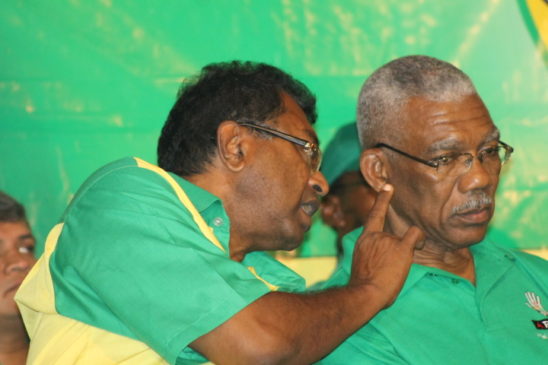
As the APNU/AFC coalition continues to review the Cummingsburg Accord, the parties are still to deliberate on who will be its prime ministerial (PM) candidate for next year’s March elections.
This is according to the coalition’s Presidential Candidate and current President, David Granger.
“We expect that in the course of the discussions with the Alliance for Change, we will look at personalities. Right now, we are just dealing with policies and principles… So we haven’t come down to personalities,” the Head of State told reporters on Wednesday.
The Cummingsburg Accord, which the two parties signed in order to form the governing coalition back in 2015, stipulates that the APNU gets the Presidential Candidate while the AFC will provide the PM candidate.
As such, the minority party has elected its leader, Khemraj Ramjattan, to lead alongside Granger at the upcoming polls.
But while Ramjattan is confident that he will be running as the PM candidate, the APNU is yet to accept his candidacy. The majority coalition party said that this will have to be discussed by the two partners, which are currently the in the process of reviewing the Accord.
According to the Head of State, the review process is being done through a three-stage process, that is, compiling core principles, reviewing the Cummingsburg Accord and drafting a joint manifesto.
He explained that APNU had compiled their core principles among its five partners – the People’s National Congress Reform (PNCR), the Working People’s Alliance (WPA), Justice for All Party (JFAP), National Front Alliance (NFA) and the Guyana Action Party (GAP).
Among the issues within the partnership were Indigenous affairs and cash grants from oil revenues. The APNU leader noted that these corresponding changes, as well as others from the other parties, were also made.
“These discussions took place over a period of weeks so only when we achieved a high degree of consensus that we approached the AFC and happily, the AFC has agreed on our core principles. So that now is finished and we are now discussing the reviewing of the Accord,” the Head of State said.
Nevertheless, the coalition leader expects that during the course of this month, they will move further along towards resolving issues regarding the Cummingsburg Accord.
While the AFC is confident, it is uncertain if it will get the prime ministerial candidate position in the elections slated for March 2, 2020.
In fact, when asked if the PM candidate would be selected from the AFC last week, Granger had noted, “It is not prudent to anticipate the outcome of negotiations”.
However, there are some who believe that APNU would sidestep AFC and go the route of choosing a prime ministerial candidate from within its own grouping. Minister of State, PNC’s Dawn Hastings-Williams, has been rumoured as the APNU’s pick for the post.
But AFC’s General Secretary David Patterson had said back in June that Ramjattan’s candidacy will have to be accepted by the majority APNU as long as the Accord is in effect.
Since coming into office after joining forces with the APNU, the minority AFC has been criticised for the submissive role it has been playing.
Decisions such as the closure of sugar estates, which put thousands of sugar workers out of jobs, were passed unchallenged and even been supported by the AFC.
In addition, there has been the strategic reallocation of responsibilities away from Ministries headed by AFC officials, to other Ministries.
There is also the fact that despite the Cummingsburg Accord stipulating the Prime Minister –in this case Moses Nagamootoo— has responsibility for chairing Cabinet and domestic issues, this was not followed through.



